May 22, 2025 | 09:17 GMT +7
May 22, 2025 | 09:17 GMT +7
Hotline: 0913.378.918
May 22, 2025 | 09:17 GMT +7
Hotline: 0913.378.918
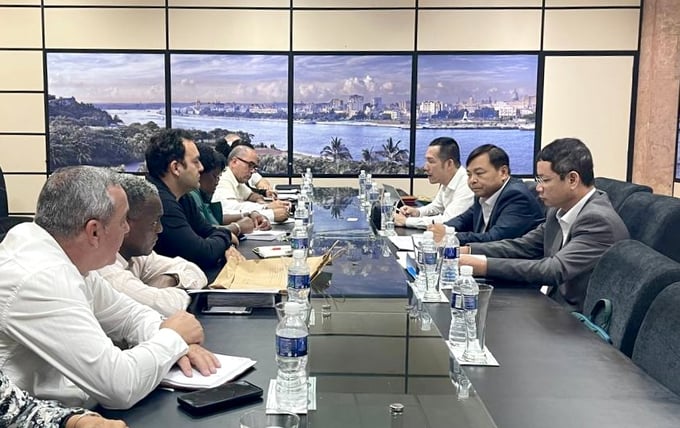
The bilateral meeting between the Ministry of Agriculture and Rural Development and the Cuban Ministry of Agriculture on April 16.
The Memorandum of Understanding on agricultural cooperation between the Ministers of Agriculture of the two countries, dated September 27, 2022, marks a turning point in bilateral cooperation. It has become the foundation for Vietnamese projects supporting agriculture in Cuba. Consequently, the cooperation projects implemented by the Ministry of Agriculture and Rural Development (MARD) in Cuba have proven effective, compliant with regulations, and have contributed to ensuring food security. The outcomes of projects focusing on rice, corn, beans, and coffee have improved seed and crop quality, increased productivity, stabilized food supply, and enhanced protein ratios.
The Deputy Minister of Agriculture and Rural Development briefed the Cuban Ministry of Agriculture on the results of cooperation in rice development in Cuba, stating, "The two governments have agreed to extend the rice project for another two years, from 2019-2023 to 2019-2025. This demonstrates the mutual interest of the two governments in rice cooperation and food security."
After five years of implementation, the project has accomplished the Rice Production Strategy in Cuba for the period up to 2025, with an orientation towards 2030, and has devised irrigation system plans in the project area to utilize water sources for rice production effectively. An agricultural extension system has also been established, comprising the National Center and 13 regional stations equipped to provide training, coaching, and resources for agricultural extension officers, rice breeding research officers, and staff.
Through two stable production seasons covering an area of 1,200 hectares, the project has tested and selected four new high-yield and quality rice varieties for replication in Cuba. Moreover, the project has developed rice seed production models covering an area of over 2,000 hectares and commercial rice production models spanning approximately 75,000 hectares. The productivity of two-crop intensive rice cropping models based on the improved irrigation system has significantly increased compared to the national productivity by 2.3 to 2.8 times.
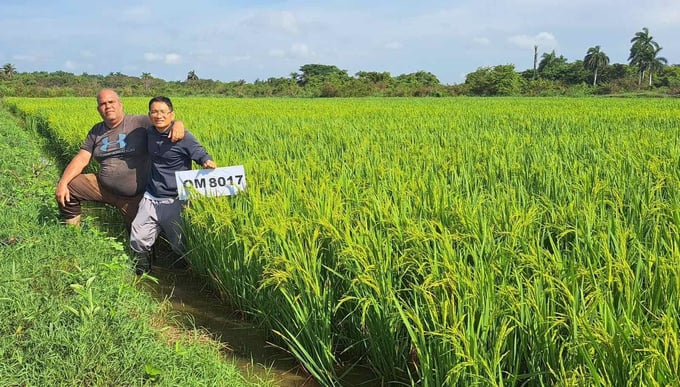
The rice development cooperation project in Cuba achieved positive results.
The Cuban Ministry of Agriculture extends gratitude to the MARD for its longstanding support. "We are focusing on renovating the irrigation system and establishing rice seed and commercial rice production models. With evident successes, Cuban officials are diligently working to swiftly adopt Vietnamese short-term rice varieties into production to boost productivity."
Vietnam is transitioning its production organization model towards green, sustainable practices and mechanization. The Cuban Ministry of Agriculture pledges to direct farms to collaborate with Vietnamese experts to innovate production methods. The Cuban side acknowledges that applying appropriate production techniques on a large scale is an inevitable trend, aiming to conserve input materials and fuel and enhance rice production efficiency.
Regarding the coffee development cooperation project, Vietnam has transferred high-yield, high-quality robusta coffee varieties suitable for Cuba's conditions. Deputy Minister Nguyen Hoang Hiep highlights Vietnam's experience: "Thanks to improvements in seed selection and the application of coffee garden replanting measures, our coffee productivity has tripled within two decades. Currently, the average yield stands at 2.6 tons/ha, three times higher than the world's average yield, with a maximum yield potential of 5-6 tons/ha."
In light of this, the leaders of the MARD request the Cuban side to continue promoting the results of phase I projects, promptly complete reports, and analyze needs and potentials for further government consideration and support. While awaiting the expansion project, the MARD stands ready to provide technical advice and exchange genetic material sources to help Cuba rejuvenate old coffee gardens and cultivate new robusta coffee in lowland areas.
Deputy Minister Nguyen Hoang Hiep anticipates the Cuban side will soon enact policies to support businesses and attract investments in agriculture, farming, and food processing in Cuba. Simultaneously, there is a need to swiftly establish mechanisms and guidelines to assist enterprises in investing in the country in exporting Cuban products to other nations, laying the groundwork for agricultural trade development in Cuba.
On the same day, the MARD delegation engaged in bilateral discussions with the Cuban Ministry of the Food Industry, the governing body responsible for food management and overseeing aquaculture feed.
The Vietnamese side appreciates the ongoing Phase 3 project to support Cuba in aquaculture. "We hope that shortly, the project will progress smoothly, and new investment projects will emerge, expanding the scope of aquaculture," remarked Liliana Mengana Orozco, Director of the Department of International Cooperation.
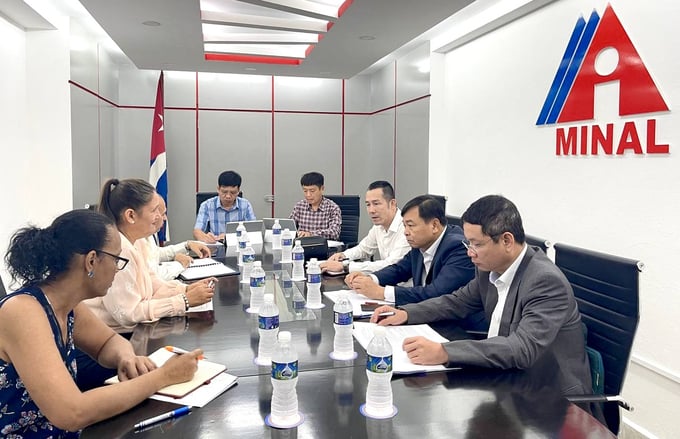
Deputy Minister Nguyen Hoang Hiep worked with the Cuban Ministry of the Food Industry on April 16.
The project supporting Cuba in aquaculture commenced implementation in April 2023. Thus far, it has organized survey and training trips for three Cuban technical staff delegations in Vietnam, with ten proficient Vietnamese experts deployed to Cuba as planned.
To ensure the project progresses according to both governments' goals, timelines, and expectations, Deputy Minister Nguyen Hoang Hiep requested Cuba's assistance in facilitating customs procedures to expedite the clearance of materials and equipment, ensuring the project stays on schedule. Additionally, arranging for adequate human resources to participate in production activities and to receive and operate machinery and equipment is essential.
In response to the MARD’s proposal, Mr. Ariel Padrón Valdéz, Sales Director of the Fisheries Industry Group representing Cuba, pledged to implement the mentioned contents, particularly ensuring appropriate capital allocation and infrastructure preparation at the farming facility. The Cuban side also expressed hope that this project's scientific and technological success would lay the groundwork for further investment projects.
Deputy Minister Nguyen Hoang Hiep emphasized, "The two countries need to replicate the successes of the aquaculture project, transitioning to a form of economic cooperation rather than merely a support project. The Vietnamese Government and the MARD are keen on collaborating in seafood exploitation with other countries, leveraging Vietnam's strengths, based on mutual interests and benefits."
Vietnam's Prime Minister has issued Decision No. 1047/QD-TTg approving the Project to develop ocean fishing and organize the deployment of fishermen to exploit seafood in the waters of certain countries. This aligns with Vietnam's strong capabilities in this area, boasting skilled fishermen and numerous boats capable of assisting Cuba in forming a seafood exploitation, processing, and export chain. Notably, the exploitation and processing of fishmeal in Cuba could be exported to Vietnam for animal feed.
Cuban representatives noted that, according to Cuban fishing laws, further exploitation cannot occur on the continental shelf. However, they eagerly anticipate Vietnamese businesses' cooperation and investment. The Cuban side agreed that if implemented, it would signify economic cooperation between companies rather than solely a support project from the Vietnamese Government.
Translated by Quynh Chi
![Reducing emissions from rice fields: [3] New values generated from carbon credit](https://t.ex-cdn.com/nongnghiepmoitruong.vn/608w/files/content/2025/05/19/dsc09613-144700_71-150957.jpg)
(VAN) In addition to helping safeguard the environment, the low-emission rice cultivation model also generates new opportunities for farmers by leveraging the carbon credit market.
![Ho Chi Minh city adapts to climate change: [1] Vulnerable in the whirlwind of development](https://t.ex-cdn.com/nongnghiepmoitruong.vn/608w/files/duyenht92/2025/05/19/3131-ngap-nongnghiep-163121.jpg)
(VAN) As the country's economic engine with a rapid urbanization rate, Ho Chi Minh city is facing increasingly serious consequences of climate change.
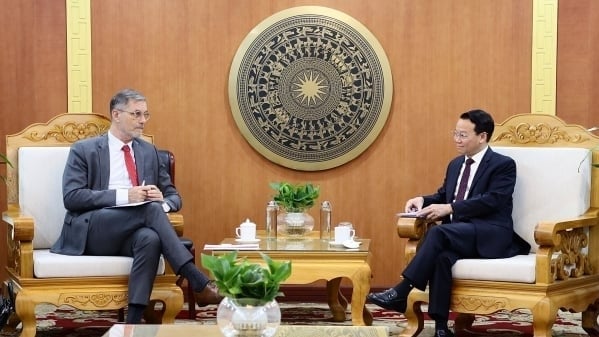
(VAN) On May 21, Minister of Agriculture and Environment Do Duc Duy worked with Mr. Olivier Brochet, Ambassador Extraordinary and Plenipotentiary of the French Republic to Vietnam.
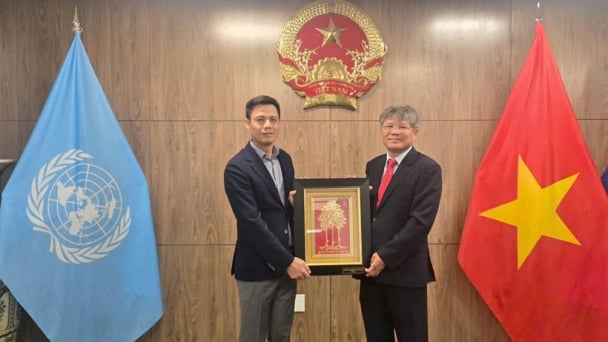
(VAN) VRG recently conducted a visit and working trip to the United States to demonstrate its efforts in redefining the role of rubber enterprises in the global value chain.

(VAN) In 2024, over 295 million people across 53 countries and territories faced acute hunger—an increase of almost 14 million people compared to 2023, while the number of people facing catastrophic levels of hunger reached a record high.

(VAN) World Environment Day 2025 (June 5) carries the theme 'Beat Plastic Pollution' continuing to emphasize the global urgency of addressing the plastic waste crisis.

(VAN) This was the assessment shared by experts at the workshop titled 'Assessing the Role and Potential of Low-Emission Rice Production Systems in Vietnam,' held on the morning of May 19.